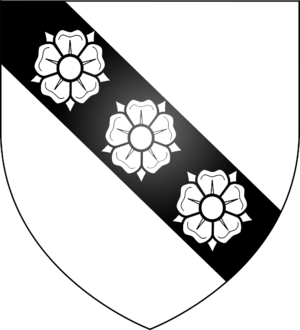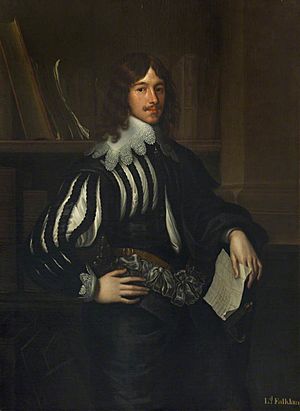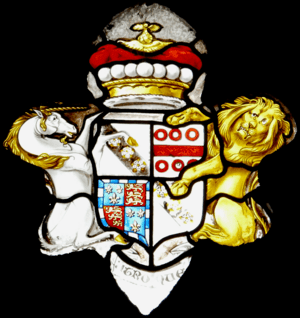Viscount Falkland facts for kids
A Viscount Falkland is a special title in the Peerage of Scotland. This title is named after the royal town of Falkland in Fife, Scotland.
Contents
History of the Falkland Title
The title of Viscount Falkland was created in 1620 by King James VI. He gave it to Sir Henry Cary. Sir Henry was born in England and did not have any family ties to Scotland before this. At the same time, he also received the title of Lord Cary.
Important Viscounts
Sir Henry's son, the second Viscount, became a very important person in government. His younger son, the fourth Viscount, later served as a top official in Oxfordshire, England. The fifth Viscount, his son, was a member of the House of Commons. He also held a high position in the navy from 1693 to 1694. The Falkland Islands in the South Atlantic Ocean are named after him!
When the fifth Viscount passed away, his family line ended. The titles then went to his second cousin, who became the sixth Viscount. This person was the grandson of the first Viscount's fifth son. He was a strong supporter of the Stuart Royal Family, who were living in exile. Because of this, he was given the title of Earl of Falkland by James Francis Edward Stuart in 1722.
Later Viscounts
The tenth Viscount was a leader in the colonies and a Liberal politician. In 1832, he received another title, Baron Hunsdon. This new title allowed him to automatically have a seat in the House of Lords, which is part of the British Parliament. However, this title ended when he died in 1884. His younger brother, the eleventh Viscount, then inherited the Scottish titles. He was an Admiral in the Royal Navy.
The twelfth Viscount, who was the nephew of the eleventh, also had a seat in the House of Lords. He was a Scottish Representative Peer from 1894 to 1922. His son, the thirteenth Viscount, also served as a Representative Peer.
Today, the fifteenth Viscount holds the titles. He became Viscount in 1984 after his father passed away. He was one of the ninety hereditary peers who were chosen to stay in the House of Lords after a new law was passed in 1999. He was a Crossbencher, meaning he did not belong to any specific political party, until he retired in 2023.
Viscount Titles and Parliament
Most Viscount titles in Scotland technically include "of" in their name. However, like other British Viscounts, most Scottish Viscounts no longer use the "of" part. Only a few, like the Viscount of Arbuthnott, still do.
There is a statue of a Viscount Falkland in St Stephens Hall, inside the Houses of Parliament. In 1909, a suffragette (a woman who fought for the right to vote) named Marjory Hume chained herself to the statue. She shouted "Deeds not words!" When the chains were removed, a small part of the statue's boot broke off. You can still see this damage today. Many people think the statue's sword broke during this event, but it actually broke shortly after the statue was first put there.
List of Viscounts Falkland (since 1620)
- Henry Cary, 1st Viscount Falkland (around 1575 – 1633)
- Lucius Cary, 2nd Viscount Falkland (1610–1643)
- Lucius Cary, 3rd Viscount Falkland (1632–1649)
- Henry Cary, 4th Viscount Falkland (1634–1663)
- Anthony Cary, 5th Viscount Falkland (1656–1694)
- Lucius Henry Cary, 6th Viscount Falkland (1687–1730)
- Lucius Charles Cary, 7th Viscount Falkland (around 1707 – 1785)
- Henry Thomas Cary, 8th Viscount Falkland (1766–1796)
- Charles John Cary, 9th Viscount Falkland (1768–1809)
- Lucius Bentinck Cary, 10th Viscount Falkland (1803–1884)
- Plantagenet Pierrepont Cary, 11th Viscount Falkland (1806–1886)
- Byron Plantagenet Cary, 12th Viscount Falkland (1845–1922)
- Lucius Plantagenet Cary, 13th Viscount Falkland (1880–1961)
- Lucius Henry Charles Plantagenet Cary, 14th Viscount Falkland (1905–1984)
- Lucius Edward William Plantagenet Cary, 15th Viscount Falkland (born 1935)
The next person in line to inherit the title is the current Viscount's son, the Hon. Lucius Alexander Plantagenet Cary, Master of Falkland (born 1963).
 | Aaron Henry |
 | T. R. M. Howard |
 | Jesse Jackson |




